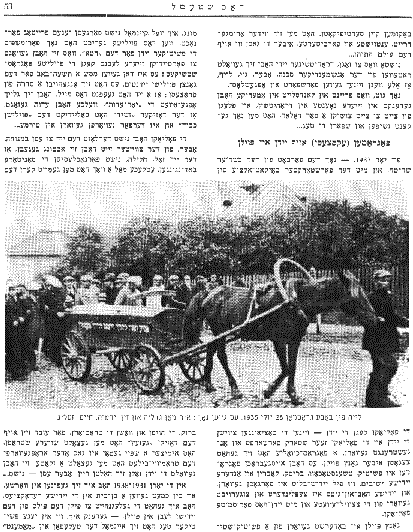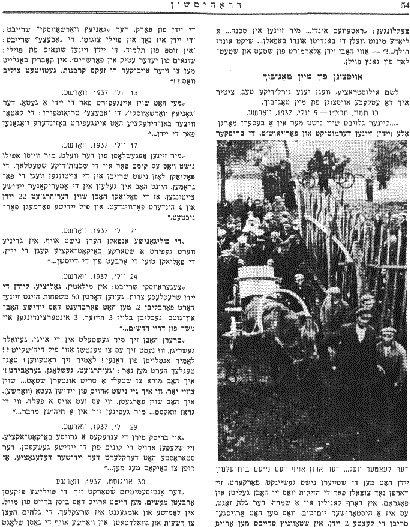Previous Page
|
Next Page
 [
Page 53
]
[
Page 53
]
obtain immigrant certificates. So they continued hanging around on the streets
of Drohitchin like they were in the twilight zone, embittered and disappointed.
It goes without saying that the
Jews of Drohitchin wanted to save themselves from the approaching danger, but
there was nowhere to go since all doors where closed to them. Of course, the
friends and former residents of Drohitchin in the United States were thinking
about their friends and relatives in Drohitichin, and would occasionally send
some money, which helped people back home to financially survive.
[Photo:] Funeral of Bobba Grossman, July 28, 1935, followed by her husband
Gedaliah and sons Yirmiyahu, Chaim and Zelig.
Pogroms against Jews in Poland
After the ban on kosher
slaughtering in 1938, and with the growing boycott by the Poles against Jews,
relations between Jews and Poles went from bad to worse. A pogrom spread
throughout Poland, breaking out in Pshitick, Tchenstokhov, Brisk, Kobrin and
other Jewish communities where Jewish blood flowed, and Jewish property was
plundered and looted by the raving anti-semitic Polish mobs.
All of Poland was overtaken by
pogrom fever. I'll never forget the Friday night when the Polish court
convicted the Jews of Pshitick of the "sin" of daring to defend
themselves against the Polish mobs! The day turned into a day of mourning for
all of Polish Jewry, and a series of court cases began, such as the one where
"witnesses testified" against a Jew who was accused of insulting
"Polish honor" and sentenced to prison.
The Poles wouldn't let the Jews
eat in peace. On the other hand, they wanted to assure that no Jew neglected
the sanitation services. Several times a week Jews had to sweep the bridge and
courtyards and wash the sidewalks. If someone disobeyed the "law"
he had to pay a heavy fine. If someone spit on the street or dropped a
streetcar ticket on the ground, he was fined one zloty. They wanted the Jews to
be clean, but not to be abel to have something to eat.
Between 1931 and 1938, I was in
Warsaw, and was virtually a member of the family at Jewish editorial offices. I
had the opportunity to feel the pulse of Jewish life in Poland. I still
remember the phone ringing on the day of Pshitick Affair at the offices of
Moment
with the following message that was transmitted throughout the cities of
Poland:
 [
Page 54
]
[
Page 54
]
"Save us, we're in danger. The mob is going to attack us any moment. Send
help!"
[Photo:] The last road. A casket on the way to the cemetery.
Excerpts from my diary
For illustrative purposes, I
would like to cite a few excerpts from my diary.
26 Tammuz, 5697 - July 5, 1937,
Warsaw
"No one believes in a
better tomorrow. All Jews have given up. The Jews of Brisk weren't spared
taxes. On the contrary, they had to pay even more for damage caused during the
pogrom. There was joy in the village of Kanilin. The priest says that it's a
historical festive day that the last two Jews were expelled. The Jews of
Stavnitz were expelled from the park. The
Goniec Warszawski
writes: 'The Jews have it too good in Poland.' The
Awece
writes: 'In the swamp of the Talmud the Jews are enemies of Poland.' Six Jews
were murdered in Kobrin; what did they do to deserve that?"
July 13, 1937, Warsaw
"A ghetto has been set up
for the Jews. The
Goniec Warszawski
and
Awece
declare triumphantly that the management of the Katowitz railway has provided
separate trains for the Jews."
July 17, 1937, Warsaw
"We're closed off from the
world. We don't even know what's going on in nearby towns. The Poles don't
allow us to write about the pogroms in the newspapers. I read today in the
American newspaper that the Poles have already killed 22 Jews and wounded 400,
and destroyed large amounts of Jewish property."
July 21, 1937, Warsaw
"The mobs don't stop. In
Gdinia they are going to boycott the Jews. The Poles are doing the work for the
Germans."
July 24, 1937, Warsaw
"
Cegerowski
writes: 'The Jews are suffering horribly in Milatin, Galicia. There used to be
50 Jewish families, and now there are only 2. Their property was burned, and
there remain only 3 houses. There were 3 acts of arson in three months."
"Tears flowed from our
eyes, and we cried
gevalt!
How do human beings turn into animals like this? Let's get out of here! Let's
save ourselves! Every day we hear the words "murdered, beaten and
robbed!" I'm scared of taking a step out of the city. I haven't left the
Jewish ghetto in Warsaw for 2 years. I've already forgotten what a field or
grass looks like. We live in a wild desert."
July 29, 1937, Warsaw
"They're starting a huge
boycott in Brisk. They force the customers out of the Jewish stores. The
municipal government told a Jewish delegation that boycotts are
permissible."
July 30, 1937, Warsaw
"Anti-semitism is getting
worse. The Poles picket stores, and tear out the smallest piece of bread from
our mouths. In Lomza and surrounding areas the situation is terrible. The
priests incite the people to wickedness and violence. Jews are being beaten on
the streets of Warsaw, and Jewish
Previous Page
|
Next Page
This material is made available by JewishGen, Inc.
and the Yizkor Book Project for the purpose of
fulfilling our
mission of disseminating information about the Holocaust and
destroyed Jewish communities.
This material may not be copied,
sold or bartered without JewishGen, Inc.'s permission. Rights may be
reserved by the copyright holder.
JewishGen, Inc. makes no representations regarding the accuracy of
the translation. The reader may wish to refer to the original material
for verification.
JewishGen is not responsible for inaccuracies or omissions in the original work and cannot rewrite or edit the text to correct inaccuracies and/or omissions.
Our mission is to produce a translation of the original work and we cannot verify the accuracy of statements or alter facts cited.
 Drogichin, Belarus
Drogichin, Belarus
 Yizkor Book Project
Yizkor Book Project
 JewishGen Home Page
JewishGen Home Page
Yizkor Book Director, Lance Ackerfeld
This web page created by Lance Ackerfeld
Copyright © 1999-2025 by JewishGen, Inc.
Updated 7 Dec 2001 by LA
 [
Page 53
]
[
Page 53
]
 [
Page 54
]
[
Page 54
]


